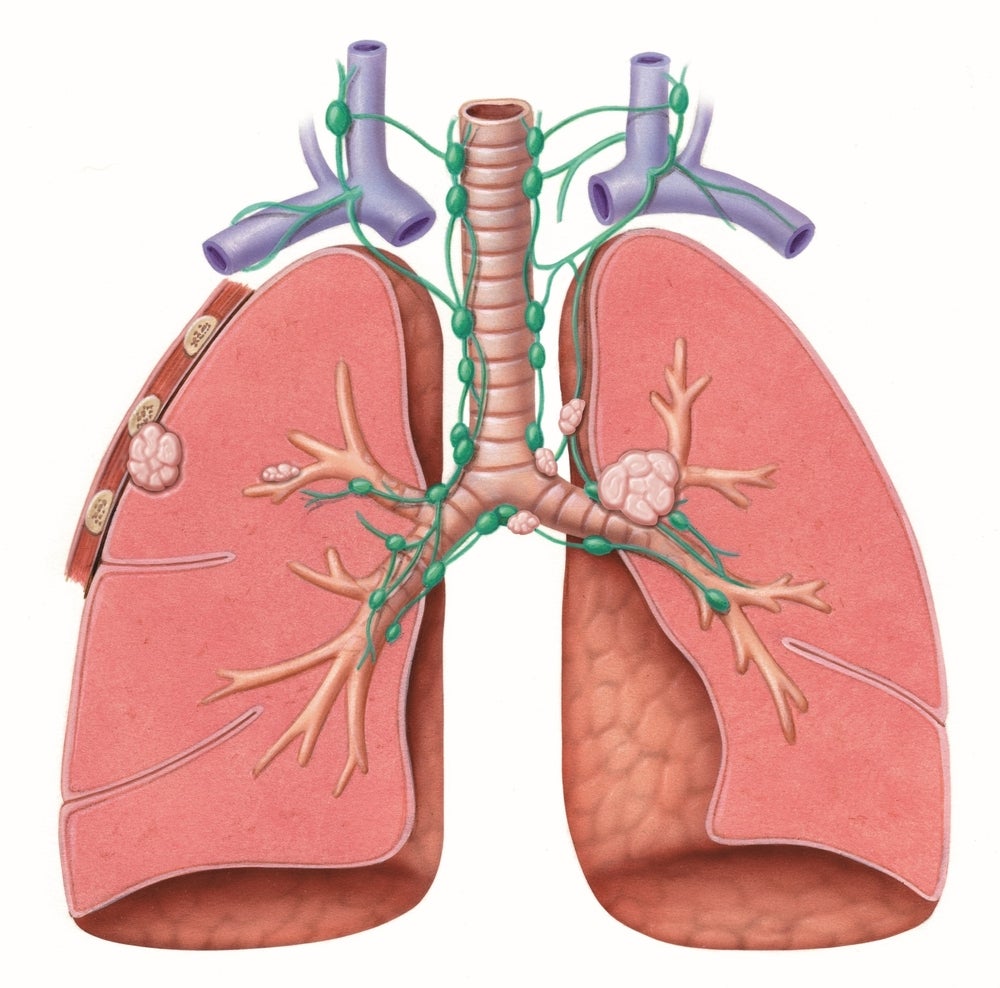At the ongoing American Society of Clinical Oncology (ASCO) Congress 2024, investigators revealed the Phase III HARMONi-A trial (NCT05184712) results of its PD-1/VEGF bispecific antibody ivonescimab, combined with pemetrexed and carboplatin chemotherapy in treating non-squamous, stage IIIB to IV, EGFR-mutated non-small cell lung cancer (NSCLC) patients who previously received any EGFR tyrosine kinase inhibitor (TKI). Compared to the chemotherapy control, ivonescimab plus chemotherapy demonstrated a superior overall response rate (ORR) of 50.6% (versus 35.4%), in addition to an improved median progression-free survival (PFS) of 7.06 months (versus 4.8 months) at a median follow-up duration of 7.89 months.
Despite a positive trend, the overall survival (OS) data was immature at the time of the presentation. Still, Grade 3 or above treatment-emergent adverse events (TEAEs) had a higher occurrence in patients in the ivonescimab arm (61.5% versus 49.1%). Outside of ASCO conference, the outcome of the Phase III HARMONi-2 trial (NCT05499390) was announced in a press release from Akeso on 30 May , where ivonescimab trumped MSD’s Keytruda (pembrolizumab) as a monotherapy in treating first-line, stage IIIB-IV, PD-L1 positive (tumor proportion score ≥1%) NSCLC patients. The encouraging results of HARMONi-A and HARMONi-2 trials marked the second success of Akeso’s Tetrabody bispecific platform after the PD-1/CTLA-4 bispecific cadonilimab.
Despite the favorable result presented at ASCO, the bispecific antibody is going to face a imminent competition in a crowded field, after a potential approval in the relatively restricted EGFR exon 19 deletion and exon 21 L858R mutated segments, composed of slightly more than 33,000 patients in the US in total. Ivonescimab is under simultaneous competitive pressure from AstraZeneca’s Tagrisso (osimertinib, for patients switching from older EGFR TKIs) and Johnson & Johnson’s combination – Rybrevant (amivantamab) and chemotherapy. The current clinical data is neither clear nor strong enough to instill adequate physician confidence to displace Tagrisso and disrupt Rybrevant’s combination in the target setting.
The presentation highlighted the candidate’s PFS benefit in patients with EGFR exon 19 deletion (HR 0.48), exon 21 L858R mutation (HR 0.43), brain metastases (HR 0.48), and the resistance-conferring T790M (HR 0.22). The OS data that granted the regimen’s NMPA approval in China (May 2024) was only at 52% maturity, showing a median OS of 17.1 months (versus 14.5 months, HR 0.80). In contrast, Tagrisso’s Phase III AURA3 trial established the TKI’s dominance with OS and duration of response (DOR) evidence focused on patients who are EGFR T790M positive, the acquired mutation consequent to the first-line exposure to first/second-generation EGFR TKIs. Apart from a mature OS, intracranial PFS of the HARMONi-A regimen would be another metric that physicians wish to see as the intravenous (IV) Rybrevant plus lazertinib combination showed improved intracranial activity over chemotherapy in its Phase III MARIPOSA-2 trial. Although cross-trial comparison may not be appropriate, Tagrisso (ORR 50.4%, mPFS 10.1 months) and Rybrevant (ORR 63%, mPFS 8.3 months) still mostly demonstrated higher numerical ORR and mPFS in their respective Phase III trials in this specific line of therapy. In the meantime, ivonescimab’s higher TEAE rate would restrict the uptake in frailer patients.
Further, emerging threats in the EGFR-mutated segment include the subcutaneous form of Rybrevant in combination with lazertinib, offering superior convenience and extended mPFS and DOR over its IV counterpart in its Phase III PALOMA-3 trial (NCT05388669). The upcoming shift of first-line practice from Tagrisso monotherapy to Tagrisso plus chemotherapy, based on the Phase III FLAURA2 study published last year, is going to dampen the penetration of the HARMONi-A regimen, limiting to patients who have an adequate platinum-free interval, as pointed out by Dr. William N. William Jr in the discussion session. It was also mentioned that MET-targeted therapies would be a likely threat to ivonescimab in the future. AbbVie’s cMET-targeting antibody drug conjugate (ADC) telisotuzumab vedotin is currently being investigated in its Phase III trial (NCT06093503) in combination with Tagrisso to treat EGFR mutated NSCLC patients who progressed after TKI exposure.
HARMONi-2 may paint a brighter future for ivonescimab in NSCLC, as the trial provides the world’s first head-to-head evidence of efficacy against the contemporary standard-of-care immunotherapy Keytruda in the first-line setting. Based on GlobalData’s NSCLC Epidemiology Forecast to 2032, an NMPA approval based on the HARMONi-2 result would unlock a market of more than 200,000 PD-1 positive, squamous and non-squamous NSCLC patients without actionable genetic alterations in urban China. Due to single-region coverage of the first-line trial, the current state of HARMONi-2 is insufficient to support an FDA filing to reach approximately 46,000 patients in the US. As the ex-China commercialisation partner of ivonescimab to Akeso, Summit Therapeutics is conducting the North America-exclusive, Phase III HARMONi-3 trial with a more limited scope of first-line, metastatic squamous NSCLC(primary completion date of September 2027). With a low rate of Grade 3 or above VEGF-related adverse events observed in HARMONi, the dual inhibitory mechanism is unlikely to add too much toxicity on top of the existing anti-PD-1 plus chemotherapy regimen. Innovative pipeline candidates, like MSD’s and Regeneron’s LAG-3 inhibitors—MK-7684A and fianlimab, respectively,, AstraZeneca’s bispecific antibody volrustomig, and its ADC datopotamab deruxtecan are looming threats that ivonescimab needs to look for.

US Tariffs are shifting - will you react or anticipate?
Don’t let policy changes catch you off guard. Stay proactive with real-time data and expert analysis.
By GlobalDataThe path to commercial success in the US may be rocky for the bispecific antibody. Even so, the possible FDA approval of ivonescimab would serve as a testimony to Akeso’s in-house bispecific platform and an important milestone for the Chinese biopharmaceutical to have its first internationally available innovative biologic.





